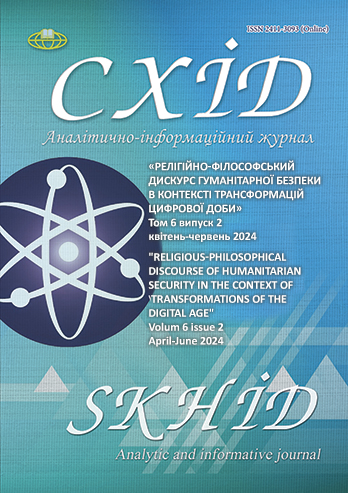Hindu Religious and Philosophical Concept in Context of Globalization and Multiculturalism: “Jivatman”
DOI:
https://doi.org/10.21847/2411-3093.629Keywords:
being, spirituality, culture, multiculturalism, traditions, soul, identity, identification, memory, philosophical knowledgeAbstract
In the 20th and 21st centuries, active interactions have occurred between representatives of various cultures and traditions. This influences religious and philosophical concepts, including those in India. Modern people wish to learn more about ancient Hindu concepts and values.
The concept of the soul plays an important role in the formation of personal and cultural identity. In this article, we focus on the term “jivatman.” Within the framework of Indian culture and philosophy, concepts such as “Atman,” “Paramatman,” “jiva,” and later “jivatman” are integral to the traditional heritage that is preserved and passed down through generations. In the context of philosophical knowledge, it is important to distinguish concepts such as Atman and soul, since they have different meanings in the religious and philosophical traditions of India. Atman is the inner Higher Self, while the soul (jiva) is the bearer of life and is subject to the laws of karma. Some philosophers and researchers identify “jivatman” as a synonym for “jiva,” meaning the soul, while others equate it with the concept “Atman.” Cultural memory plays a key role in preserving this heritage, and the various interpretations of the term “jivatman” can be attributed to the processes of globalization and the politics of multiculturalism. We examined the interpretation of the term “jivatman” in dictionaries, analyzed its use in ancient texts, and considered the opinions of philosophers, neo-Hindu religious leaders, and researchers, including Mircea Eliade, Sri Aurobindo, Srila Prabhupada, and others. The emergence of representatives of the “new Indian mythmaking,” such as Devdutt Pattanaik, also influenced modern Hindu religious and philosophical thought. Analyzing his works, we observe a tendency to conflate the two terms (Atman and jiva) leading to their identification as a single concept.
Our research indicates that Devdutt Pattanaik’s analysis often lacks depth and fails to delve into the fundamental essence of Indian philosophy. This tendency towards simplification can lead to a superficial comprehension of the foundational principles and ideas that form the basis of Indian spiritual traditions.
Downloads
References
Apte, V. S. (1893). The Student’s English–Sanskrit Dic-tionary. Mrs. Radhabai Atmaram Sagoon, Bookseller & Publisher. https://archive.org/details/-studentsenglishs00apterich/
Atamaniuk, Z. (2023). Dukhovnist osobystosti yak proiav kulturnoho rozvytku [The Spirituality of the Individual as a Manifestation Cultural Development]. Naukove piznannia: metodolohiia ta tekhnolohiia, 1(51), 30–36. https://doi.org/10.24195/sk1561-1264/2023-1-5
Aurobindo, Sri. (2012). The Complete Works of Sri Au-robindo. Volume 28. Letters on Yoga – I. Sri Aurobin-do Ashram Publication Department. http://www.collectedworksofsriaurobindo.com/index.php/readbook/08-The-Jivatman-and-the-Psychic-Being-Vol-28-letters-on-yoga-i
Bhaktivedanta Swami Prabhupada, A. C. (1968, No-vember 12). Letter to: Malati. https://prabhupadabooks.com/letters/los_angeles/november/12/1968/malati
Bhaktivedanta Swami Prabhupada, A. C. (1974, March 30). Morning Walk [Speech audio recording]. Bhak-tivedanta Vedabase. https://vedabase.io/en/library/transcripts/740330mwbom/
Bowker, J. (Ed.). (2000). Advaita Vedanta. In The Con-cise Oxford Dictionary of World Religions. Oxford University Press. https://archive.org/details/isbn_9780192800947/
Brodetska, Y. (2023). Buttia ta yoho metafizychno-ontolohichni proektsii: filosofska refleksiia [Genesis and Its Metaphysical-Ontological Projections: Philo-sophical Reflection of the Problem]. Filosofiia ta politolohiia v konteksti suchasnoi kultury, 15(2), 10–15. https://doi.org/10.15421/352337
Bystritsky, Y., Zimovets, R. & Proleev, S. (2020). Komunikatsiia i kultura v globalnomu sviti [Communi-cation and Culture in Global World]. Kyiv, Dukh i Litera.
Gotynyan-Zhuravlova, V. (2022). Multykulturalizm yak kliuchovyi parametranalizu sotsialnykh I kultur-nykhiavyshch i protsesiv [Multiculturalism as a Key Parameter of the Analysis of Social and Cultural Phenomena and Processes]. Doksa, 2(38), 76–84. https://doi.org/10.18524/2410-2601.2022.2(38).283064
Eliade, M. (1990). Yoga: Immortality and Freedom. Princeton University Press.
Jiva. (n.d.). In Word for Word Index. Bhaktivedanta Data-base. https://vedabase.io/en/search/synonyms/?original=jiva&hierarchy=%2F0001%2F0001%2F0001%-2F0003%2F0002
Jiva atma. (n.d.). In Word for Word Index. Bhaktivedanta Database. https://vedabase.io/en/search/synonyms/?-origi-nal=jiva+atma&original_choices=contains&hierarchy=%2F0001%2F0001%2F0001%2F0003%2F0002
Kurma Dasa. (1999). Remembering Srila Prabhupada – Meeting with philosopher. In The Great Transcenden-tal Adventure: Pastimes of His Divine Grace A.C. Bhaktivedanta Swami Prabhupada in Australia and New Zealand. https://iskcondesiretree.com/profiles/-blogs/remembering-srila-prabhupada-meeting-with-philosopher
Levchenko, V. (2022). Muzeinist u systemy pochuttiv kulturnoi pamiati [Musealization in the System of Senses of Cultural Memory]. Doksa, 1(37), 138–142. https://doi.org/10.18524/2410-2601.2022.1(37).281828
Lukash, O. (2024). V Vseukrainska konferentsiia indolo-hiv: korotkyi ohliad vystupiv ta podii [5th All-Ukrainian Conference of Indologists: a brief overview of speeches and events]. http://indology.ho.ua/books/v_indology_conference.pdf
Macdonell, A. (1893). A Sanskrit-English Dictionary. Longmans, Green and Co. https://archive.org/embed/afr4858.0001.001.umich.edu
Monier-Williams, M. (1899). A Sanskrit–English Diction-ary. Clarendon Press. https://archive.org/embed/wSpc_a-sanskrit-english-dictionary-by-sir-monier-williams-1899-clarendon-press-oxford
Mukhopadhyay, A. (2020). Origin of Consciousness. In Discovery of Self: Who Am I? AuthorsPress. https://www.academia.edu/50742130/Discovery_of_Self
Pattanaik, D. (2017). Devlok with Devdutt Pattanaik 2. Penguin Random House India. https://a.co/d/cbcqSPt
Pattanaik, D. (2019). A Body with Eight Bends. https://devdutt.com/articles/a-body-with-eight-bends/
Ribhu Gita – Shivarahasya Amsha 6. (n.d.). https://sanskritdocuments.org/sites/ribhugita/
Ryzhik, M. T. (2024). Devdutt Pattanaik’s Interpretation of Hindu Philosophy: Tradition Continuation or Spiritual Crisis? Perspektyvy. Sotsialno-politychnyi zhurnal, 1, 109–117. https://doi.org/10.24195/spj1561-1264.2024.1.15
Sri Brahma-Samhita 5.20 (n.d.) https://vedabase.io/en/library/bs/5/20/
Srimad-Bhagavatam 7.7.19–20. Canto 7: The Science of God. Chapter Seven. (n.d.). In Srimad-Bhagavatam (Bhagavata Purana). Bhaktivedanta Vedabase. https://vedabase.io/en/library/sb/7/7/19-20/
Upanishads 110. (2023). Internet Archive. https://archive.org/details/shastras-upanishads/page/920/mode/2up
Yurchenko, L., & Starovoitova, I. (2022). The philosophy of the Ukrainian ethnic group’s destruction in the So-viet period. Skhid, 3(1), 29–34. https://doi.org/10.21847/1728-9343.2022.3(1).271314
Downloads
Published
How to Cite
Issue
Section
License
Copyright (c) 2024 Марія Рижик

This work is licensed under a Creative Commons Attribution-NonCommercial-NoDerivatives 4.0 International License.
1. Authors bear responsibility for the accuracy of facts, quotations, numbers and names used.
2. Manuscripts are not sent back.
3. The publisher does not always agree with the authors' opinion.
4. The authors reserve the right to authorship of the work and pass the first publication right of this work to the journal under the terms of a Creative Commons Attribution-NonCommercial-NoDerivatives 4.0 International License. This license allows others to distribute (copy) the published work for non-commercial purposes, provided there is mandatory attribution to its authors and a link to the first publication in our journal.
5. The authors have the right to conclude separate supplement agreements that relate to non-exclusive work distribution in the form in which it has been published by the journal (for example, to upload the work to the online storage of the journal or publish it as part of a monograph), provided that the reference to the first publication of the work in this journal is included.

